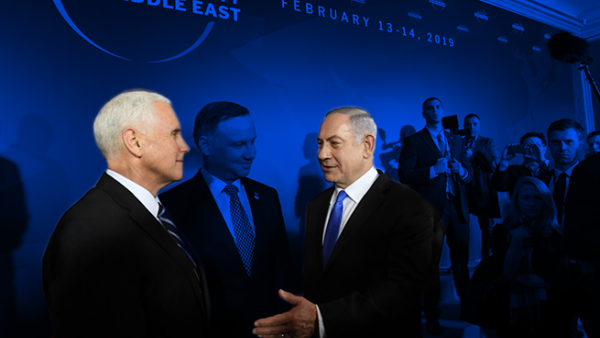By Ty Joplin
In the run-up to the U.S.’ invasion and occupation of Iraq in 2003, then-president George W. Bush tried to assemble a multilateral coalition to organize the war effort.
Very few European allies were willing to contribute significantly, as many saw the war to be both legally dubious and potentially entangeling. Rather than sell the war as a unilateral occupation, Bush called the thin assemblage of countries willing to participate the “Coalition of the Willing.”
The vast majority of coalition members sent only residual support personnel: only the U.K and U.S. sent significant numbers of troops to the country for an extended period of time. But by Spring 2009, even the U.K. had mostly withdrawn, leaving the U.S. virtually alone in Iraq.
The “Coalition of the Willing,” many pointed out, was a mirage designed to hide the U.S.’ singular militaristic stance with regards to the Middle East, in contrast to its European allies.
Against Iran, the U.S. appears to be creating a new “Coalition of the Willing.”
On Feb 13-14, Warsaw, Poland hosted a security conference nominally designed to strategize about peace in the Middle East. U.S. officials setting the agenda, however, decided to focus almost entirely on how to confront Iran.
European leaders sent low-level delegates or none at all, while some left early. In a telling moment, U.S. Vice President Mike Pence tried to rouse an applause from the delegation by mentioning Trump name, only for it to be meant by abject silence. Pence waited, realized no applause was coming, and went on with his speech as if the crowd had always been on his side.
The conference was largely panned as a failure, another in a long list of fumbles from the Trump administration.
But the conference’s failure is a symptom of a larger disintegration in the Trans-Atlantic Alliance between western Europe and the U.S, experts tell Al Bawaba. While Europe consistently favors diplomatic engagement with potential antagonists like Iran, the U.S. is opting for threats and biting sanctions. That difference came to a head in Warsaw.
It appears European leaders are trying to wait out Trump’s Presidency and his foreign policy in the hopes he can be replaced in the 2020 presidential election. But the impact of his policies are already being felt in the Middle East in was that will be difficult to reverse, even if Trump departs from the White House.
Israel and Saudi Arabia are creating a U.S.-backed military bloc to counter Iran, which looks to last for years to come. Meanwhile, the war in Yemen continues with U.S. support, permanently ending the lives of tens of thousands of civilians while threatening to take millions more.
Isolation for the U.S. in Warsaw
Leaders and civil servants congregate in Warsaw (AFP/FILE)
The Warsaw summit was designed by the U.S. to justify its approach to Iran while potentially bringing other countries on board with it. Currently, the U.S. strategy under Trump has been to isolate the country as much as possible, empower its military foes and force it to come to the negotiating table or even potentially force a regime change in Tehran.
To try and isolate Iran globally, Trump pulled out of the much-lauded nuclear deal, re-imposing crippling sanctions on Iran's economy that have already had disastrous effects.
Europe remains as dedicated to preserving the nuclear deal as ever. Naturally then, European countries, who are weary of Trump’s staunch position on Iran, did not take the bait with the Warsaw summit.
The U.K.’s foreign secretary Jeremy Hunt left the two-day event early. France sent a low-level civil servant. Germany sent its junior foreign minister, and the E.U. external affairs chief boycotted the conference entirely.
“Rather than uniting the world against Iran, the poorly planned Warsaw meeting underscored the divisions in the world about Iran,” Bruce Riedel, senior fellow and Director of the Intelligence Project at the Brooking Institution, explained to Al Bawaba.
“The Iranians will undoubtedly seek to play the different countries against each other,” he added.
By the conduct of U.S. officials, it would seem the U.S. is thoroughly dedicated to precipitating regime change in Tehran, even if there isn’t a clear replacement for the residing government.
“The Iranian regime openly advocates another Holocaust and seeks the means to achieve it, Vice President Mike Pence told a delegation in Warsaw. Outside the conference, Trump’s personal lawyer and former mayor of New York City Rudy Giuliani spoke to a crowd of Mujahideen al-Khalq (MEK) members. Iran’s rulers, Giuliani yelled, are “assassins, they are murderers and they should be out of power.”
Back in Washington D.C., Trump’s national security advisor, John Bolton, spoke openly about sparking regime change in Tehran before recieving apparent advice not advance that position openly.
A few weeks before Warsaw, Bolton appointed Richard Goldberg of the Foundation for Defense of Democracies, to lead a division called Countering Iranian Weapons of Mass Destruction (WMD) in the U.S. National Security Council. According to an FDD biography of Goldberg, he is “a leading architect of the toughest sanctions imposed on the Islamic Republic of Iran.”
However, Sanam Vakil, a senior research fellow at Chatham House and the director of its Iran Forum project, says the U.S. lacks a unitary foreign policy in general, precluding it from having a cohesive stance against Iran. Though she notes that “hostility with Iran is intrinsic to US’ approach to Iran,” she also observes internal “factionalism," beleaguering the U.S. government.
The Trump Administration has been plagued by internal leakers releasing information to the public regarding chaos inside the White House, at least one senior member of his staff penned a letter declaring himself or herself to be part of an anti-Trump resistance and it is now a ritual occurrence that current and former intelligence and Department of State officials denounce decisions made by Trump.
Even Rex Tillerson, the U.S.’ former Secretary of State, tried to devise a way for the U.S. to stick with the Iran nuclear deal. His departure spelled doom for the U.S.’ participation in the deal.
Given the constant internal ruptures and cold international reception Trump’s team experienced in Warsaw, the summit looks to have isolated the U.S. more than create a new ‘Coalition of the Willing.’
Netanyahu’s Victory in Warsaw
Netanyahu (left) with U.S. Secretary of State Mike Pompeo (right) (AFP/FILE)
Robert Czulda, a professor at the University of Lodz, sees the Warsaw summit in different terms. He understands the conference as a way for the U.S. to shore up a burgeoning Israeli-Arab strategic alliance.
“An argument that the U.S. has isolated itself is an argument presented by Iran and then repeated several times by some commentators. The U.S. was able to gather several Arab states at the Warsaw Summit so I don`t know how the U.S. is isolated,” Czulda told Al Bawaba.
“But first of all the event was a great success for Israel—by attending the same event and sitting at one table the Arab states confirmed legitimacy of Israel… legitimacy of Israel among the Arab states has always been an issue,” he added.
During the summit, Israeli Prime Minister Benjamin Netanyahu told senior officials of neighboring Arab countries that "this is an open meeting with representatives of leading Arab countries that are sitting down together with Israel in order to advance the common interest of war with Iran.”
“I don`t think it was a peace conference,” Czulda said.
Netanyahu’s hawkish overtures to Arab countries comes just a few months before elections in Israel on April 9, that could see Netanyahu voted out of power. As such, pursuing an aggressive stance against Iran appears to be a core part of Netanyahu’s electoral strategy in spite of the fact that it’s isolating Israel from Europe.
For now, it is working: Netanyahu’s party is leading in the polls and the runner-up has aligned himself with Netanyahu’s position on Iran. The presidential result may still be up in the air, but Israel’s confrontational strategy with Iran is all but set in stone.
What the Warsaw Summit Means for Peace
Mike Pence speaking at the Warsaw Summit (Janek Skarzynski/AFP)
According to Joost Hiltermann, the director of International Crisis Group’s Middle East program, the failure of the Warsaw summit to bring together European and U.S. foreign policies is a symptom of a broader, more fundamental disagreement.
“A serious rift has emerged in transatlantic relations. It's not just about Iran -- though this is very much part of it—but goes much beyond: the INF [Intermediate-Range Nuclear Forces] treaty, climate change, the Syria withdrawal announcement, Trump's approach to NATO, etc. It's about how Trump sees the world and U.S. alliances.”
The list of foreign policy disputes between the U.S. and Europe has is long and growing.
The INF treaty between the Soviet Union and the U.S. liquidated vast swaths both countries’ stockpiles of dangerous ballistic and cruise missiles. Trump collapsed the agreement on Feb 1, 2019 in a move the E.U. officials fear will make Europe vulnerable to development of new ballistic missiles. Trump also unilaterally withdrew from the famed Paris Agreement aimed at slowing climate change despite the pleas from the E.U. NATO officials were reportedly blindsided by Trump’s decision to abruptly pull out of Syria.
“The Iran issue is a clear manifestation of this growing rift,” Hiltermann added.
Europe’s major powers like the U.K., Germany and France have sought to preserve the Iran nuclear agreement and maintain the economic deals that were allowed to go through after sanctions were lifted in exchange for Iran’s promise not to develop nuclear weapons.
“The Europeans want to stick to the nuclear deal with Iran, because they see it as the best way to prevent nuclear proliferation, and as potential leverage over Iran regarding other concerns, such as Iran's actions in the Middle East, its ballistic-missile program, and human rights. They also value the multilateral aspect of the deal,” Hiltermann said.
“By contrast, this U.S. administration has an obsession about Iran, wants to undo the legacy of Obama, and is looking for an issue around which they believe they can rally domestic and allied foreign audiences. But as we saw in Munich last week, there are no buyers for this approach in Europe.”
To thread the needle between Iran and the U.S., the E.U. set up a firm, INSTEX or the Instrument in Support of Trade Exchanges. designed to bypass U.S. sanctions and allow companies to continue their business dealings with Iran. But even with INSTEX, dozens of lucrative deals have been cancelled, and economic projections show a looming recession in Iran.
“The E.U. is trying to preserve the deal but can only go so far. It’s an awkward position, because Iran is not a bastion for democracy; it’s not an easy country to defend,” Sanam Vakil said, referring to the county’s systemic human rights violations, pursuit of a ballistic missile program and its expansive foreign policy.
This narrow path in between two antagonists, the U.S. and Iran, is becoming increasingly untenable and isolating in and of itself, so E.U. leaders appear to be holding out hope that Trump will leave the White House in 2020, so they can regain an international policy consensus with the U.S.
A nuclear explosion (Shutterstock/Department of Defense)
“The Europeans are waiting for 2020 and outlasting Trump so they will be cautious and let Trump play his game,” Bruce Riedel explained. On top of the Europeans, Joost Hiltermann adds that Iran too, is “waiting out this administration to see if things will change after 2020.”
While Europe and Iran wait for Trump to leave, potentially irreparable damage is being done in the name of confronting Iran.
If his party wins the April 9 election, Netanyahu will be scheduled to hold power until at least 2023. Efforts to consolidate an Israel-GCC bloc focused around hard power and proxy wars are moving fast. Most urgently, the U.S.’ Oversight Committee revealed that Trump’s team have been secretly working to provide nuclear technology to Saudi in an attempt to give it nuclear parity with Iran.
All of these developments embolden Israel and Saudi to pursue military means in order to combat growing Iranian influence, giving less and less room for effective diplomatic engagement.
European leaders would then have to face a newly empowered and potentially nuclear-ready Israeli/Saudi partnership, one already isolated from Europe, and persuade it to come back to the negotiating table. If future events move on the pace and magnitude they are currently at; those calls for peace may fall on deaf ears.







